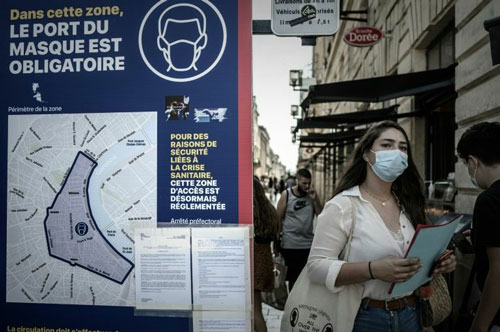New York
The World Health Organisation cautioned Thursday about “alarming rates of transmission” of coronavirus across Europe and warned countries against shortening quarantine periods.
The WHO’s regional director for Europe Hans Kluge said the number of coronavirus cases seen in September “should serve as a wake-up call for all of us.”
“Although these numbers reflect more comprehensive testing, it also shows alarming rates of transmission across the region,” he told an online press conference from Danish capital Copenhagen.
The health body also said it would not change its guidance calling for a 14-day quarantine period for anyone exposed to the novel coronavirus.
“Our quarantine recommendation of 14 days has been based on our understanding of the incubation period and transmission of the disease. We would only revise that on the basis of a change of our understanding of the science,” WHO Europe’s senior emergency officer Catherine Smallwood said.
In France for instance, the recommended length for self-isolation in case of exposure has been reduced to seven days.
It is 10 days in the UK and Ireland, and several more European countries, such as Portugal and Croatia, are currently considering reducing their recommendations.
“Knowing the immense individual and societal impact even a slight reduction in the length of quarantine can have… I encourage countries of the region to make scientific due process with their experts and explore safe reduction options,” Kluge said, adding that the “concept of quarantine must be protected” and “continuously adapted.”
The 53 member states of WHO Europe have recorded nearly five million cases of COVID-19 and more than 227,000 related deaths, according to the organisation’s own figures.
The number of daily cases recorded is currently between 40,000 and 50,000, comparable to a daily peak of 43,000 on April 1 — although testing in many countries has increased considerably.
A new record was set on September 11, with some 54,000 cases recorded in 24 hours. The World Bank on Thursday said that the ongoing coronavirus pandemic threatens to diminish progress made in the last decade in improving child education and health, particularly in the poorest countries
The conclusion comes in the Washington-based development lender’s Human Capital Index for 2020, which ranks countries on how well children are prepared for the future, with an emphasis on factors like schooling and healthcare.
This year’s report shows that most countries, particularly poorer ones, have made steady gains in improving health and education prior to the pandemic.
Despite that, the bank said in a statement a child in a low-income country will likely achieve only 56% of their human capital compared to one with access to complete education and full healthcare.
The indicator purports to measure the level in life that a child born today can hope to reach by age 18.
World Bank President David Malpass told reporters those gains are now jeopardised by the pandemic.
“Human capital is absolutely vital to the financial and economic future of the country as well as the social well being,” he said.
Inequalities among children are set to increase, Malpass said, warning of disturbing trends such as the eighty million children lacking essential vaccinations.
“We think more than one billion children have been out of school due to COVID, and (they) could lose as much as $10 trillion in lifetime earnings,” he said, citing their reduced education level as well as the potential they would drop out of school.
He warned girls to face a “disproportionate” risk and called on countries to invest in education broadly.
First launched in 2018, this year’s Human Capital Index includes data from 174 countries representing 98 percent of the world’s population.—AFP









